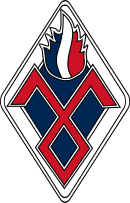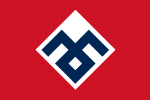National Popular Rally
|
National Popular Rally
Rassemblement national populaire |
|
|---|---|
 |
|
| President | Marcel Déat |
| General Secretary | Georges Albertini |
| Founded | 1941 |
| Dissolved | 1945 |
| Headquarters | Vichy |
| Newspaper | Le National Populaire |
| Ideology |
Neo-Jacobinism Pan-Europeanism Neosocialism Antisemitism |
| Political position | Third Positionism |
| Religion | Roman Catholicism |
| Colours | Blue, red, white |
| Party flag | |
 |
|
The National Popular Rally (French: Rassemblement national populaire, RNP, 1941–1944) was a French party, and one of the main collaborationist parties under the Vichy regime of World War II. It was created in February 1941 by former members of the French Section of the Workers' International of the neosocialist tendency, led by Marcel Déat. The party was heavily influenced by Fascism and saw the circumstances of the occupation as an opportunity to revolutionarise France.
Marcel Déat, a Neo-Socialist expelled from the French Section of the Workers' International (SFIO) in November 1933 and former Minister, first proposed to create a single state party during the 1940 summer, immediately following the proclamation of the Vichy regime. Briefly arrested by the French police on 13 December 1940, he finally created the RNP in February 1941, which became one of the primary Collaborationist parties, along with Jacques Doriot's French Popular Party (PPF) and Marcel Bucard's Francisme.
Immediately, the German authorities imposed a fusion between Marcel Déat's RNP and the far-right Social Revolutionary Movement (MSR) of Eugène Deloncle, an inheritor of the Cagoule terrorist group The first committee of direction of the RNP-MSR was composed of two RNP members and three MSR members: Marcel Déat, Jean Fontenoy, Jean Van Ormelingen (alias Jean Vanor), Eugène Deloncle and Jean Goy.
...
Wikipedia
